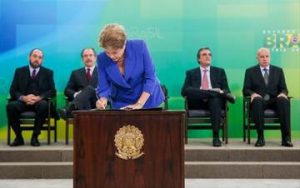Check out the main points of the anti-corruption package, signed on 18/03 by President Dilma Roussef

President Dilma Rousseff symbolically delivered last Wednesday (18) to the National Congress, in a ceremony at the Planalto Palace, the so-called “Anti-corruption package”, set of proposals prepared by the Executive to inhibit and punish irregularities in the public administration.
The package brings together projects that are already underway in the Legislative on the topic and new proposals prepared by the Executive.
Main points
Check below the six points of the anti-corruption package announced by the president:
1. Criminalization of cash practice 2 (use of undeclared resources, especially in election campaigns). Currently, the practice is considered a criminal offense, that is, a lighter offense, punishable by a lighter penalty.
2. Application of the Clean Record Law for all positions confidence in the federal government sphere.
3. Early sale of seized assets after acts of corruption to prevent them from being used by public officials and being sold through an auction. This bill has been in Congress since 2011, but now the government has asked for constitutional urgency. According to the Constitution, projects with this character have 45 days to be voted on in the House and another 45 in the Senate. If the deadline is not met, the project will lock the agenda of the House in which it is in progress and no other proposal can be voted on.
4. Criminal accountability of public officials that do not prove that the goods were obtained. The government also defends the approval of a new type of crime that punishes public officials who have enrichment incompatible with the gains. A project on the subject has been in progress since 2005. Now, the government says it will promptly encourage the approval of the project.
5. Confiscation of public servants' assets who have enrichment incompatible with earnings. Congress received a Constitutional Amendment Proposal (PEC) from the president, which must be passed in two rounds in the House and Senate, with at least three-fifths of the votes and each round.
6. Signature of the decree that regulates the Anti-Corruption Law, which holds legal entities accountable for committing acts against the public administration and punishes companies involved in acts of corruption
Sources: Globo.com, UOL (18/03)



